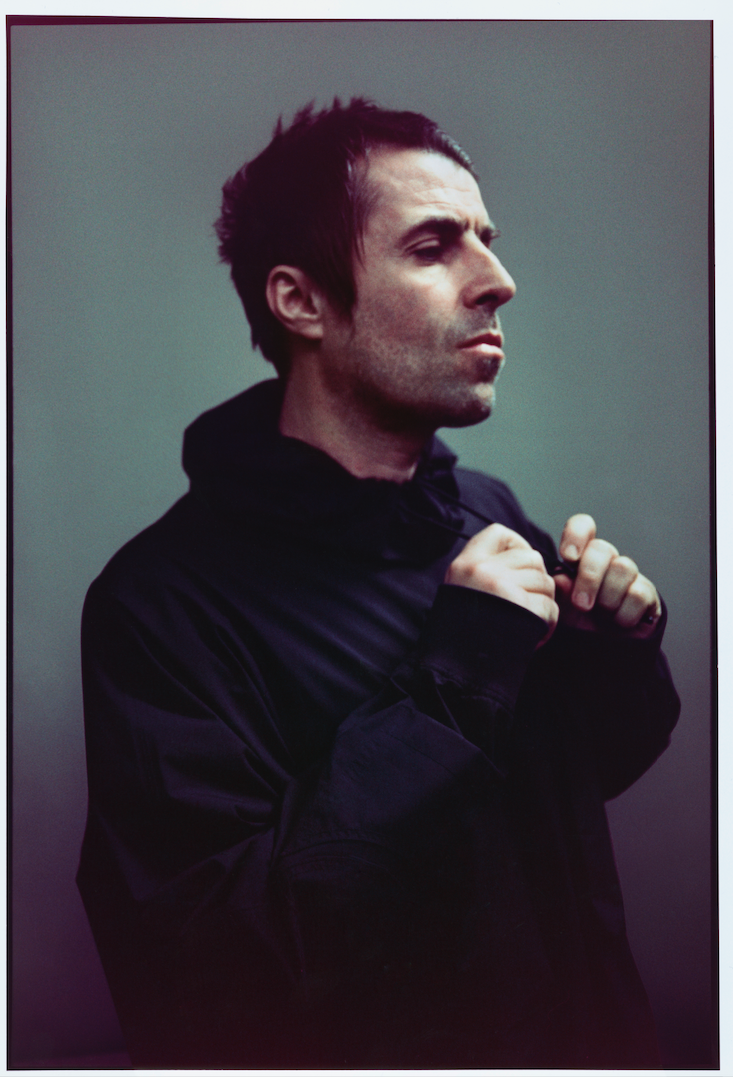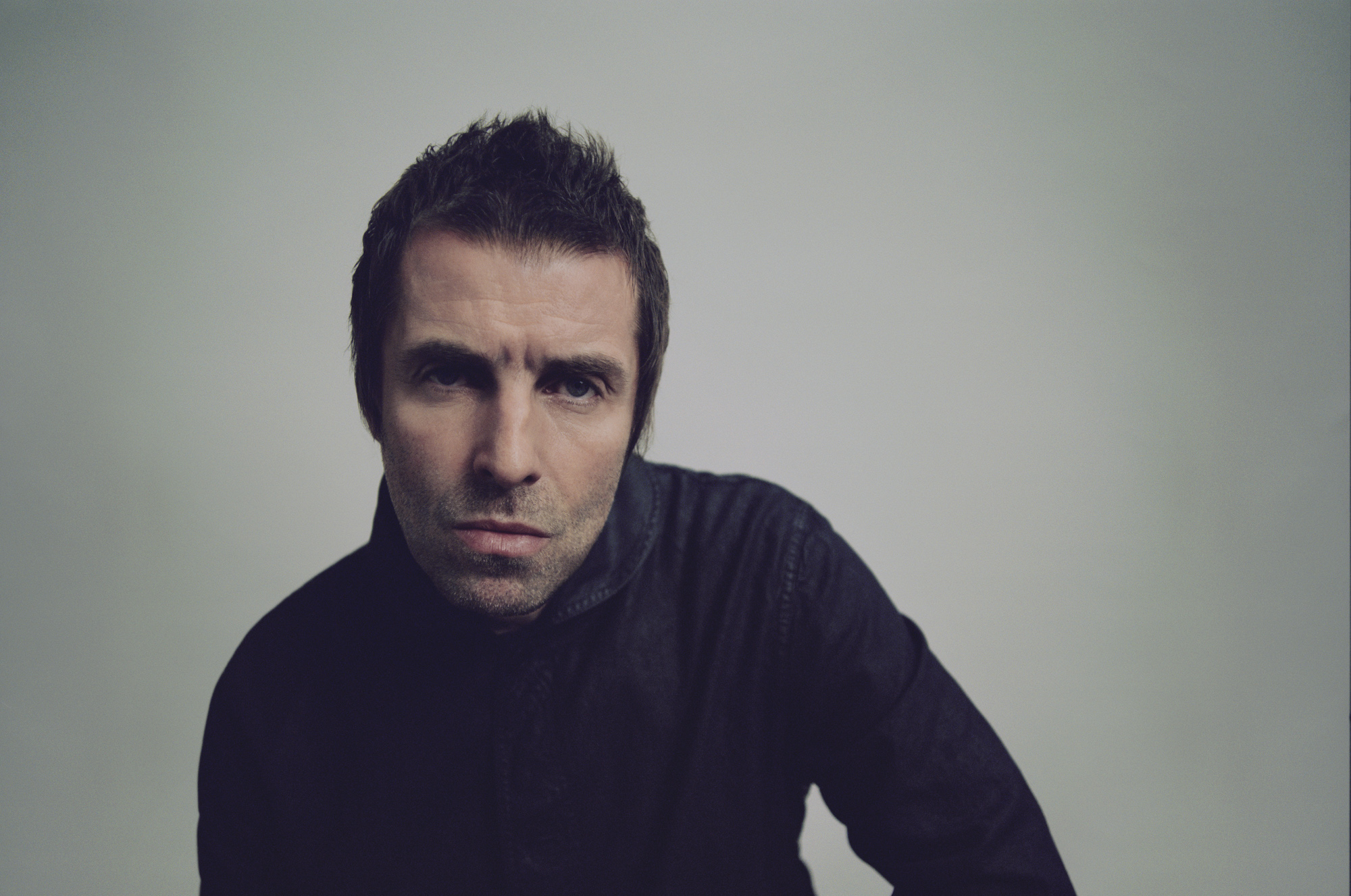There is a stack of parkas neatly arranged on top of Liam Gallagher’s hotel bed. The arms are all stuck out, in colors ranging from rose hues to muted tones. Gallagher is, of course, known for wearing these outerwear items no matter the season. At the moment, he has chosen one in navy, which goes nicely with the dark wash of his jeans.
“I’ve always liked my clothes,” he says. During any kind of communication, speaking or listening, his eyes never lose focus. At first they’re hidden behind unusual hexagon shades; but when he removes those, without the glass buffer, it’s disarming to be on the receiving end of his gaze.
“It’s always the same things with me,” says Gallagher. “I hate people who change. What’s the point of starting if you’re going to change? You change a little bit, and shift gear every now and again, but you don’t do a makeover. I’m very comfortable in my own skin. I always thought I was a decent person—not an angel, but half-decent. I’m going to be like this forever.”
During his time as the frontman of Oasis, he didn’t get a lot of opportunities to showcase his straightforward personality. With the 2017 release of Gallagher’s debut solo album, As You Were, and the avalanche of interviews he did in support of that—over twenty years after he first came to the public’s attention—the world at long last became acquainted with him.
Gallagher performed at festival after festival, even before the release of As You Were, then embarked on multiple-legged tours after. On the tour’s final stretch, his voice began to deteriorate. He sounded hoarse, not hitting the high notes. Gallagher has Hashimoto’s disease, an auto-immune condition that damages the thyroid gland; one of the effects is hoarseness. He takes pills daily for the condition, keeping it under control, though he might still have a bout here and there.
“I know how good I am and I know how shit I am,” says Gallagher. “I still smoke and I still drink so my voice is always going to get a bit of wear and tear. I look after my voice the day before a gig. I get an early night in. I don’t smoke the day of. I warm up a little bit, have my drinks. I’m an aggressive singer. That’s the way I like to sing. I never want all that, ‘singing from the diaphragm.’ That’s weird shit. Soon as I open my mouth, I belt it out as much as I can and hope for the best. That’s the story of my life. I never don’t give it 100 percent. I have no second gear. If I’m a bit sore, I go to bed. All them rock ‘n’ roll antics, someone else can do. I’ve done it.”
Two years later, with his voice back in proper form, Gallagher is back with follow-up album Why Me? Why Not., which doesn’t veer too far from the rock ‘n’ roll of As You Were. Gallagher continues the symbiotic songwriting and studio relationship with Andrew Wyatt and Greg Kurstin to pump out Beatles-inspired riffs like those found on “Alright Now” and rocking stompers such as “Shockwave” and “The River,” and they even incorporate string parts that enhance the emotional pull of songs, like “One of Us” and “Once.”
“The thing is, when you do the TVs, they go, ‘Have you seen your kid?’ And I go, ‘You don’t give a fuck whether I’ve seen my kid.’”
But the main area of interest for the media during this press cycle, as always, seems to be Gallagher’s relationships—particularly the non-existent ones. The one with his eldest child, Molly, a daughter he had with singer/songwriter Lisa Moorish when he was married to Patsy Kensit. The one with his youngest child, Gemma, another daughter he had with journalist Liza Ghorbani when he was married to Nicole Appleton. And the infamous one with his brother Noel, which was the stuff of sibling legend from the start of Oasis.
Regarding Molly Moorish—who has changed her name to Molly Moorish Gallagher—a scroll through Instagram reveals her with her brothers, Lennon and Gene, the three of them undeniable chips off the old block. Attached to their father, they travel everywhere with him and his seven-years-strong partner and manager, Debbie Gwyther.
It is Gwyther who has been instrumental in forging this connection. “Debbie was saying the boys and Molly are meeting out in clubs, nodding at each other and not really saying anything,” says Gallagher. “She was saying she thought it was time I met Molly. I was thinking, it’s been a long time, but I wanted to do it. We met in a pub around our way. We got on instantly and we’ve been hanging out ever since. The past is the past. All we’re doing now is getting on with it.
“It’s a nice new vibe in the air,” he continues. “It’s nice having a girl around. But she’s not a girly girl. She was out partying with Debbie the other night. Me and the boys were home and knackered by eleven o’clock. They were out until the next day, came back in a Rolls and jumped in the pool. She’s a bit of a lad. The boys love her.”
Regarding Gemma Gallagher, he says, “At this moment in time, there’s no relationship with the mother. When she gets older and reaches out and all that, I’m open for it all. Them things will take time. The thing is, when you do the TVs, they go, ‘Have you seen your kid?’ And I go, ‘You don’t give a fuck whether I’ve seen my kid. The people in the crowd, and the people in the papers don’t give a fuck if I’ve seen my kid. It’s just that’s the only thing you’ve got. You don’t give a shit if I’ve seen her or not.’ It will happen, when it happens.”
Regarding Noel, he may no longer be part of Gallagher’s sphere, but thats Noel’s choice. As Gallagher explains, “There’s no reconnecting with him. That geezer’s on another planet.” As far as sibling dynamics, Paul, the oldest of the Gallagher brothers, is part of Gallagher’s entourage, and has been since the Oasis days.
“He was around because I wanted him around,” says Gallagher of Paul, who DJs ahead of his performances. “He’s cool. I like the music he plays. He’s a good crack. And it’s nice to have him about. I love him. Obviously, I haven’t seen Noel for a bit, so I have to have the family I can. The most important thing is family. Anything after that is a treat.”
Much of this dynamic is witnessed on As It Was, a behind-the-scenes documentary that focuses on the time leading up to the creation of As You Were and the supporting tours. To quote Variety, the film is “a feature-length EPK”—and Gallagher doesn’t disagree.
“I’m not chasing anything. All I wanted to do was be in a band and do it on our own terms. I did that with Oasis.”
“It wasn’t much of a film,” he says. “Don’t be getting too excited. It’s just a camera following me around in a parka doing these gigs. Halfway through, I didn’t want to do it. I had just done Supersonic and I had said everything I got to say. But I’m glad we did it, because things were getting a bit personal and when I look back on it, it’s nice to have the film. But I don’t think it’s showing more than what people already knew.”
There is another film being put together by Oasis’ management, set for release next year. This one is about the historic Oasis shows at Knebworth in 1996, where the aforementioned 2016 Oasis documentary Supersonic culminated.
“I’m not chasing anything,” admits Gallagher. “All I wanted to do was be in a band and do it on our own terms. I did that with Oasis. Now, I just want my voice to be on good music, to make good records, try and give people what they want, and then go home and live my life, stay happy.” FL








